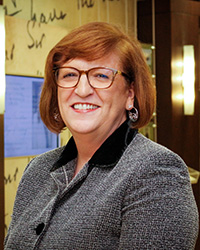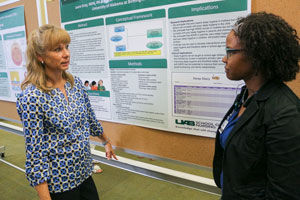By Erica Techo
The University of Alabama at Birmingham School of Nursing has once again seen an increase in funding to support graduate students, garnering $4.6 million in program support and workforce development funding for the 2018-19 school year.
 Linda MoneyhamThe School of Nursing’s Master’s and Doctor of Nursing Practice programs are ranked 8th in the nation, with two graduate specialties ranked among the top 10 and two among the 15 in the country.
Linda MoneyhamThe School of Nursing’s Master’s and Doctor of Nursing Practice programs are ranked 8th in the nation, with two graduate specialties ranked among the top 10 and two among the 15 in the country.
The $4.6 million for graduate student support includes $3.5 million in U.S. Department of Health and Human Services, Health Resources and Services Administration (HRSA) education and training grants through the Advanced Nursing Education Workforce Program (ANEW), the Nurse Faculty Loan Program (NFLP), Advanced Nurse Education Program (ANE), the Nurse Education, Practice, Quality and Retention (NEPQR) and Nurse Anesthesia Traineeship Program (NEP).
$1.3 million comes from federal agencies and foundations, such as the U.S. Department of Veterans Affairs, the Centers for Disease Control, the Jonas Foundation, the National Institute of Occupational Safety and Health and the Robert Wood Johnson Foundation.
“This increase in support is proof of the commitment of our faculty, who see the potential our graduate students have and who work with them to find funding for their education. The funds come from both our faculty and our donor base, and it takes the commitment of writing proposals, being competitive in those proposals and looking at innovative ways to get our students the best resources available,” said Dean and Fay B. Ireland endowed Chair in Nursing Doreen C. Harper, PhD, RN, FAAN. “Our faculty believe in our students, and they are committed to helping our students understand this process. That’s what faculty in a Top 10 School of Nursing do to support students.”
The School of Nursing is one of five in the state to receive highly competitive HRSA funding for 2018-19. Those grants include more than $793,000 through the Nurse Faculty Loan Program which aims to increase the number of qualified nursing faculty by supporting doctoral students who are enrolled in the School’s Doctor of Philosophy in Nursing or Doctor of Nursing Practice programs. They are formula-based grants, meaning the amount provided depends on cost of tuition and fees per student per academic year.
 A PhD student makes a research presentation in 2015.
A PhD student makes a research presentation in 2015.
“The NFLP grants are very important to our doctoral students who intend to assume nursing faculty roles upon completion of the doctorate because there is very little funding to support students in doctoral education, particularly for those who are completing a clinical doctoral or attending part-time,” said Senior Associate Dean for Academic Affairs Linda Moneyham, PhD, RN, FAAN. “The NFLP monies are a great deal for doctoral students in that up to 85 percent of the loan is cancelled if they are employed full time in a school of nursing for the first four years after completing the doctorate. Also, interest on the NFLP is only 3 percent, the lowest amount charged on any educational loan. Supporting these students is very important to our goal of growing the nursing faculty workforce.”
A four-year, $2.8 million Nurse Education, Practice, Quality and Retention (NEPQR) grant from HRSA, of which $700,000 will be available this year, will support a project focused on training and sustaining baccalaureate-prepared RNs in medically underserved areas. NEPQR grants, which provide nearly $1.2 million in funding this year, focus on training students and RNs to practice to the full scope of their license, which positively impacts care and cost management.
“Alabama and the U.S. have a primary care service deficit, especially in medically underserved areas, and BSN-prepared RNs are capable of assuming greater responsibility for care management for patients with chronic conditions across all levels of prevention, as well as follow-up and complex specialty care coordination for those discharged from the hospital,” said Maria Shirey, PhD, MBA, MS, RN, NEA-BC, ANEF, FACHE, FAAN. “BSN-prepared RNs can provide safe, high-quality care to at-risk populations such as patients with multiple chronic conditions, while also managing the costs of such care.”
Several grants will also support the School’s efforts to improve quality of and access to care in Alabama’s rural and underserved areas. Through Advanced Nursing Education Workforce (ANEW) Program and Advanced Nursing Education (ANE) grants, the School can enhance academic-practice partnerships committed to improving primary care access across Alabama.
“HRSA grants are used to support our mission in contributing to a highly-educated nursing workforce which can positively impact health systems through new models of care that increase both access to care for underserved populations and improve the quality of the care received,” Moneyham said. “For example, our ANE and ANEW grants from HRSA have allowed us to focus on preparing advanced practice nurses with the knowledge and skill to manage and increase access to the care of rural and underserved populations.”